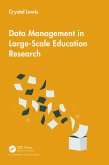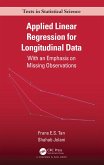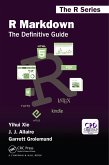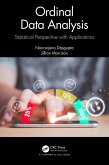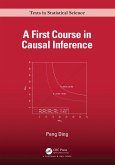This book is for anyone involved in a research study involving original data collection. While the book focuses on quantitative data, typically collected from human participants, many of the practices covered can apply to other types of data as well. The book contains foundational context, instructions, and practical examples to help researchers in the field of education begin to understand how to create data management workflows for large-scale, typically federally funded, research studies. The book starts by describing the research life cycle and how data management fits within this larger picture. The remaining chapters are then organized by each phase of the life cycle, with examples of best practices provided for each phase. Finally, considerations on whether the reader should implement, and how to integrate those practices into a workflow, are discussed.
Key Features:
- Provides a holistic approach to the research life cycle, showing how project management and data management processes work in parallel and collaboratively
- Can be read in its entirety, or referenced as needed throughout the life cycle
- Includes relatable examples specific to education research
- Includes a discussion on how to organize and document data in preparation for data sharing requirements
- Contains links to example documents as well as templates to help readers implement practices
Dieser Download kann aus rechtlichen Gründen nur mit Rechnungsadresse in A, B, BG, CY, CZ, D, DK, EW, E, FIN, F, GR, HR, H, IRL, I, LT, L, LR, M, NL, PL, P, R, S, SLO, SK ausgeliefert werden.
Joscelin Rocha-Hidalgo, Pennsylvania State University
"Data Management in Large-Scale Education Research is a game changer for education researchers wanting to improve their research practices. The book seamlessly blends theory and practice, offering a pragmatic guide for ethically and systematically managing and sharing data."
Crystal Steltenpohl, Center for Open Science
"This book is a direct answer to the critical need for practical and accessible resources for education researchers who are managing primary data collection. Crystal Lewis introduces robust methods for the collection and management of data within the broader research context. Readers will acquire knowledge and confidence in leading large-scale studies, as well as skills and strategies they can implement in their work immediately. This book should be on the shelves of all graduate students, project managers, data managers, and PIs conducting research in education!"
Leigh McLean, Center for Research on Educational and Social Policy, University of Delaware
"Education researchers: do not skip this book! Crystal Lewis gives you the tools you need to manage your data better in order to make your project run smoothly."
Kristin Briney, Biology Librarian, California Institute of Technology, and author of "Data Management for Researchers: Organize, Maintain and Share Your Data for Research Success"
"An outstanding guide for those learning how to manage large-scale data in the social sciences. The book embraces the tenets of open science, highlighting the importance of reproducible science."
Lexi Swanz, Vanderbilt University
"Crystal Lewis has translated years of experience in applied research into a practical and indispensable guide to all aspects of data management across the educational research cycle. This book provides everything you need to perfect your data management practices and engage in research that is consistent with open science principles and the ever evolving demands of grant funding agencies."
Dan Cohen, SRI International
"This book is a treasure for those in the field of Education and beyond. Many practicing statisticians and industry data scientists have never endured the process of collecting their own data, and statistical education largely assumes away such complexities, taking complete and correct data as a given. Lewis' incredibly clear and readable book can be a revelation to data analysts on the complexity, nuances, and subjectivity that goes into data collection. This framework will undoubtedly help many consider how to handle bias and complexity in their own analysis and better manage their derivative data products with the level of care that Lewis coaches her readers to give."
Emily Riederer, Capital One, and author of "R Markdown Cookbook"



